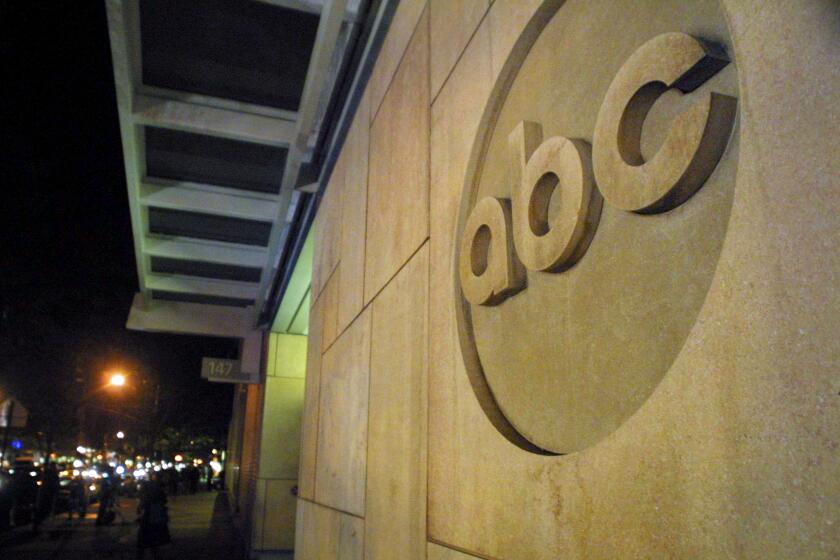‘Lego Batman’ movie poised to beat ‘Fifty Shades Darker’ at the box office

Will Arnett, Ralph Fiennes, Michael Cera and Rosario Dawson voice characters in “The Lego Batman Movie.”
- Share via
This weekend, moviegoers will have to decide whether they want to enter Bruce Wayne’s Batcave or Christian Grey’s Red Room of Pain. According to midweek estimates, the Batcave is looking like the safer bet.
Despite competition from newcomers, “The Lego Batman Movie” will likely be the No. 1 film at the box office in the U.S. and Canada, ending the three-week reign of M. Night Shyamalan’s low-budget hit “Split.”
The computer-animated comedy spinoff will probably gross about $60 million to $65 million domestically Friday through Sunday, according to people who have seen pre-release audience surveys.
That should be enough to fend off Universal Pictures’ naughty romantic follow-up “Fifty Shades Darker,” as well as the Keanu Reeves action sequel “John Wick: Chapter Two.” All three should give the movie business a much-needed jolt after a sleepy Super Bowl weekend that delivered disappointing openings for Paramount Pictures’ “Rings” and STX Entertainment’s “The Space Between Us.”
For Warner Bros., the likely success of “The Lego Batman Movie,” which cost $80 million to make, will perform double duty by strengthening two of the Burbank studio’s key franchises. One is the DC Comics superhero brand that has taken a beating from reviewers as of late because of “Batman v Superman: Dawn of Justice” and “Suicide Squad,” though both were big box-office successes. The other is Lego, the toy behemoth that Warner Bros. turned into a surprisingly popular film in 2014 with “The Lego Movie.”
A strong opening for the spinoff, which focuses on the over-the-top Lego Batman character voiced by Will Arnett, bodes well for Warner Bros. as it looks for ways to ride the unexpected popularity of the original that grossed $258 million in the U.S. and Canada. The plastic caped crusader’s standalone film should benefit from the lack of other recent animated movies in theaters, plus early reviews praising the picture’s irreverently comic take on the generally downbeat Batman storyline.
Second place should go to “Fifty Shades Darker,” Universal’s sequel to the R-rated romance that beat its competition two years ago by catering to female moviegoers over the Valentine’s Day weekend. It grossed $93 million in its first four days in theaters, on its way to a domestic total of $166 million.
The sequel isn’t getting audiences quite as hot and bothered, with analysts predicting $40 million to $50 million in ticket sales through Sunday. That would still be considered a financial success for a movie that cost about $55 million to make, though it’s a considerable drop-off from the original, which had the good fortune to open over a long weekend that coincided with Valentine’s Day. The erotic E.L. James book series was still a publishing phenomenon when the first movie was released.
The other wide release to watch this weekend is “John Wick: Chapter Two,” from Lionsgate’s Summit Entertainment label, which is poised to become the now rare type of sequel that does better than its predecessor.
Lionsgate’s 2014 original, starring Keanu Reeves as a highly efficient ex-hitman out for revenge, was a decent performer at the box office, grossing $43 million total in the U.S. and Canada. But the movie became a cult hit for home viewing, especially among young males.
The follow-up is expected to open with $22 million in ticket sales, significantly better than the original’s $14-million opening. The studio is projecting no more than $19 million, but there’s a possibility it will overperform, given the loyal audience for the original and the mostly positive reviews, which have noted the R-rated movie’s impressively choreographed violence.
Meanwhile, “Split” will end its run at No. 1 with more than $100 million in domestic ticket sales, the first M. Night Shyamalan movie to cross that barrier since “The Last Airbender” in 2010. It marks a remarkable return to form for Shyamalan, who self-financed the $9-million thriller, released by Universal.
More to Read
Inside the business of entertainment
The Wide Shot brings you news, analysis and insights on everything from streaming wars to production — and what it all means for the future.
You may occasionally receive promotional content from the Los Angeles Times.











